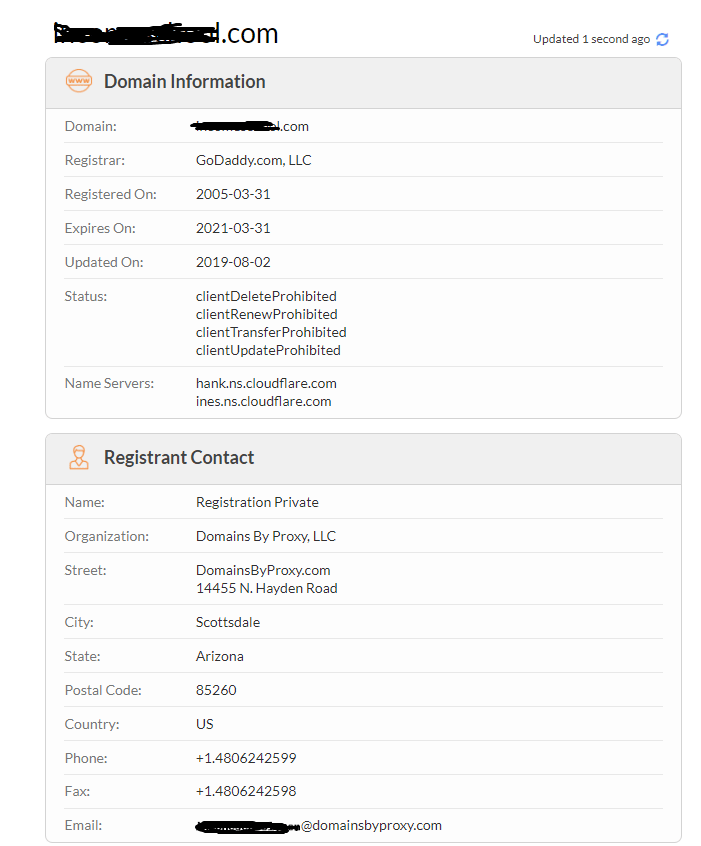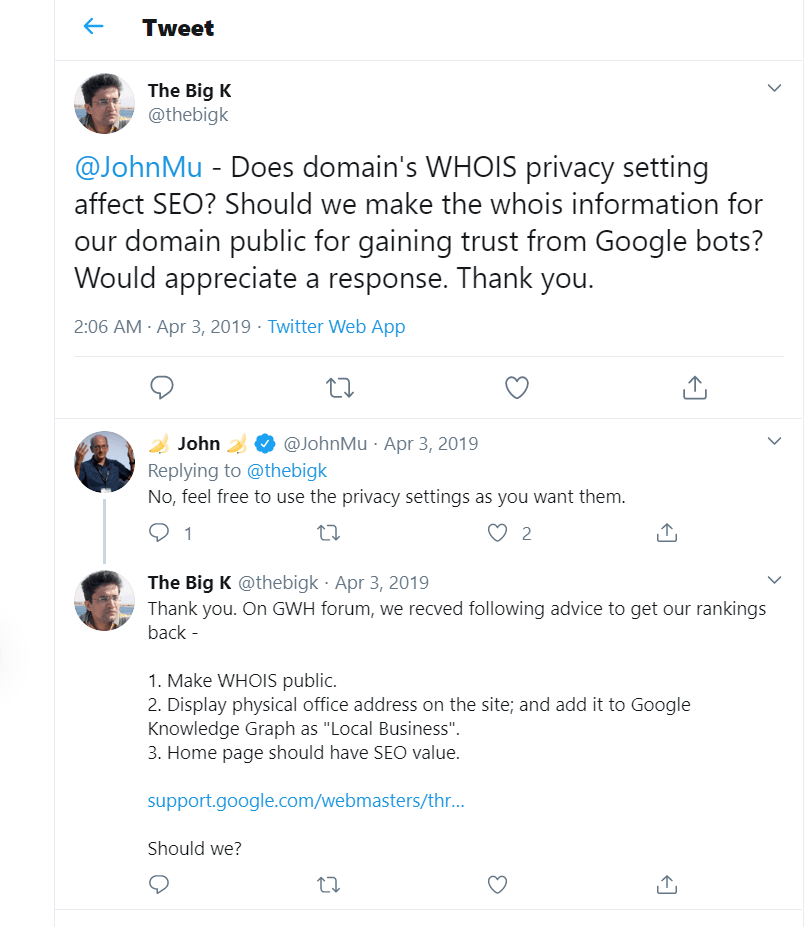Is Domain Name Privacy Worth it (+Get It For Free)?
Buying a domain name privacy as a new owner is always a dilemma. It is normal to ask yourself if privacy worth the money you will spend. Most of the people have this question mainly for Godaddy privacy protection product.
So, is domain name privacy worth it? Domain name privacy isn’t really worth it unless you get it for free . Especially from 2018 because of the new policies that regulators applied, it seems unnecessary for some users.
Keep reading to find out in detail why I have that opinion and which are the domain registrars that offer free domain name privacy.
What is Domain Name Privacy Protection?
Domain name privacy is a service that a lot of domain registrars offer and it hides your personal information otherwise available in whois public database.
When you register a domain it is mandatory to provide your personal details. These are your full name, full address, email, and phone number. After that, the whois database contains your details.
The public has access by using many different sites such as whois.icann.org. A lot of years ago registrars understood the need for privacy for many domain name owners.
It was a decision that covered the concern of the domain name owners and provided an additional stream of revenue for the registrars.
If you purchase domain name privacy they replace your personal details when a whois search occurs. Instead, they present totally different contact details but you are still the legitimate owner of the domain. Here is how a whois search looks like when you have privacy:

The registrar replaces these details with the information of a forwarding service. They can partner with this company or they can own it (like Godaddy does). There is still a phone number, full address, and email. The registrar takes responsibility for the record details instead of the actual owner (*who is called registrant).
If someone really wants to contact the domain owner he can visit the whois page of the registrar, in this case: https://godaddy.com/whois . Then he can submit a form with the message he wants to send. In our example, Godaddy will redirect the email to your inbox but you are not obligated to answer.
This process eliminates a lot of the spam emails since it can’t be done automatically. Only real people will contact you and if they really want to. If your email is public, people can use programs to collect it automatically. Then, they can create lists with emails from many domain name owners and send messages in bulk.
*Source: whois.icann.org/en/privacy-and-proxy-services
Here is a table with the partners some registrars use for the privacy services they offer:
| Godaddy | Domains by Proxy |
| Namecheap | WhoisGuard |
| WhoisProxy | |
| Namesilo | PrivacyGuardian |
| Epik | Anonymize |
What is The Whois Database
Whois database is maintained by different entities related to domain names registration. These are the registrars (retailers) and registries (wholesalers or records administrators). ICANN oversees both entities and sets the policies for the whois database.
**Actually ICANN oversees the most popular domain name extensions (.com, .net. .org). There are multiple versions of whois databases that are under the provision of other entities. For example, Eurid is responsible for .eu whois policies in place.
They created the whois database to promote better transparency on internet space. Since whois reveals the real domain owner can help in many difficult circumstances. These include but not limited to things such as brand protection, trademark issues, tracking of illegal or spam behavior (like bulk unauthorized emails).
It also speeds up the domain transfer between different registrars. During domain transfer, the email of the domain name owner is used as an additional verification factor. It ensures that he really wants the transfer to happen.
Is it Worth Paying for Domain Privacy and Do I Need it?
At first, it looks frightening that your personal details are available all over the internet. Unless you are a celebrity or you have a very popular website you will not get so many incoming emails or calls. Usually, these emails end up in your junk folder anyway.
You can also add the address and phone of your office so you don’t need to reveal where you actually live or your personal phone number. Despite what I say, I really understand those persons that still have privacy concerns.
In that case, use a registrar that offers free privacy. It may look strange but most of them actually offer this service for free. This fact is not so well-known since most end-users register their domains with Godaddy. That happens because their marketing efforts are very good and the interface is easy for beginners. Personally, I wouldn’t purchase Godaddy Domain Privacy.
These are some of the domain registrars that offer free domain name privacy and their links to their pages that explain their service: namecheap.com/security/whoisguard/, dynadot.com/domain/privacy.html , namesilo.com/Support/WHOIS-Privacy, epik.com/support/knowledgebase/enabling-domain-privacy-with-anonymize-com/
I mentioned at the beginning of the post that for some users domain privacy is unnecessary. That applies for European users because of GDPR (General Data Protection Regulation) and Temporary Specification for gTLD Registration Data from ICANN icann.org/resources/pages/gtld-registration-data-specs-en .
Most of the personal details are not visible because of those policies. This is how it looks when you search for a domain in the whois database that a European user owns. You can see only the country and state/province. So, you can’t really identify the domain name owner.

There are some domain name extensions that you can’t use domain privacy by default. There are also some other extensions that have domain privacy policies in place. Here are is a list of them:
| .us | Back in 2005 National Telecommunications and Information Administration announced that domain name privacy is not an option anymore for .us domains. |
| .ca | By default, you have free privacy as an individual. If you are registered as a company you need to consult your registrar. |
| uk, .co.uk, .org.uk, .me.uk | From 2018 Name and address of the registrant (owner) are not available on whois search. All other details are still public. |
| .in | Privacy protection services are not permitted. |
| .it | Registrars don’t support privacy for this domain. |
| .ch | Most registrars don’t offer privacy for this domain. |
| .li | Most registrars don’t offer privacy for this domain. |
| .eu | For legal entities name, address, email, fax, and phone are public. For individuals only the email is available. |
| .gr | All private information is hidden. |
| .al | No information is available. |
| at, .co.at ,.or.at | From May of 2018 only companies and organizations, details are public. If you are an individual no info is available. |
| .de | No info is available for the public. Only for legal reasons, personal information can be available. |
| .fi | No info available for individuals, companies data is shown upon a whois request. |
| .fr | No personal data is available. For legal entities all the possible information is public. |
| .is | By default, personal information on individuals is hidden except the country. For companies, you can actually see the details with a whois search. |
| .nl | If an individual owns a domain, only the email is public. If a company owns the domain, the name is available too. |
| .ovh | Only the country is available. |
Can I Buy Domain Privacy Later?
You can add domain privacy at any point even if initially you didn’t buy it. In the meanwhile, your details would be available for the public if they do a whois database search.
There are also tools (mostly paid) that they can search for whois historical records. In that case, if your details were available at some point (no privacy) they will show up in that search.
Does Domain Privacy Hurt SEO?
Domain privacy services are around for years and google knows that legitimate individuals or companies use them for logical reasons.
Google has stated clearly that private registration doesn’t affect your site’s rankings. Take a look at the next screenshot. It is a tweet from a Google Employee John Mu who holds the role of Webmaster Trends Analyst.

If you are ready to start your own website and you search for quality hosting and a free domain check my review of what I use for my current website.